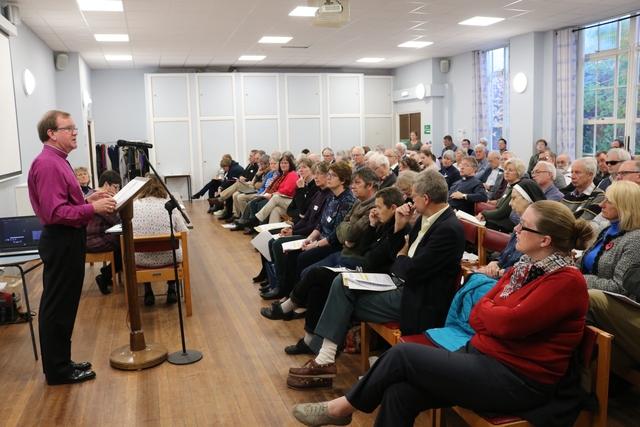
Diocesan Synod, March 2019
Click here to download the full Powerpoint presentation for this synod meeting
PRESIDENTIAL ADDRESS:
Bishop Christopher spokes about our calling to ‘live’ as disciples, as part of our diocese’s live | pray | serve vision, and emphasised that we are all called by our baptism to life in Jesus Christ.
In response to a question submitted in writing beforehand, he mentioned the House of Bishop’s guidance on the use of the liturgy of Affirmation of Baptism Vows with those who had been through a process of changing gender. He said this reminded us that gender transition doesn’t change that person’s identity in Christ, and that this liturgy could remind us all of our common bonds in Christ.
He said that our live | pray | serve vision emphasised growth in three ways, and that growth in depth came first, before growth in impact and growth in numbers. Our hope for growth was therefore a hope that all of God’s creation would grow in depth, and be caught in the “divine ecology of blessing”. Read the full text here.
BISHOP’S COUNCIL and DIOCESAN STAFF:
Bishop’s Council members each stood to introduce themselves. There was also an introduction to various members of diocesan staff, whose photos, roles and motivations for doing their jobs were displayed on the screen.
BISHOP’S COUNCIL UPDATE:
Diocesan synod members were given a brief report on the recent activity of our Bishop’s Council, which is the synod’s standing committee. You can read it here.
GENERAL SYNOD REPORT:
Canon Peter Leonard, one of our representatives on the Church of England’s national decision-making body, gave an update on its recent meeting. He suggested that its agenda in February 2019 had been perhaps more outward-focussed that usual.
There had been debates in evangelism, especially focussed on outer estates and to young people. There had been some tidying up of legislation, with much publicity given to the removal of a requirement for every church to hold an act of worship each Sunday. There was a debate on homelessness, which resulted in the setting up of a national task force, and some discussion of the ‘Living in Love and Faith’ project, which will publish some guidelines next year about human identity, sexuality and marriage. For a summary of General Synod business, click here.
LIVE PRAY SERVE and PASTORAL REORGANISATION:
Archdeacon Gavin Collins told synod members what had changed with regard to our live | pray | serve vision and the associated pastoral reorganisation of parishes since the previous synod meeting in November.
He explained how extensive feedback from those parishes affected had prompted Bishop’s Council members to postpone their consideration of pastoral reorganisation from December until January. That feedback meant that draft proposals submitted to Bishop’s Council in January were significantly different from the original proposals suggested in the autumn. The plans had significantly changed in two of the three areas – full details here.
He also spoke about the reasons for the changes, which were to do with mission and sustainability. Bishop’s Council were driven by the imperative for more people to know about the love of God, to recruit younger churchgoers, to enlarge congregations and to create new ones. It was also true that some existing parishes were having to dip into their reserves to pay parish share, which is unsustainable in the long term.
Synod members asked questions about a range of issues, including:
- Some concern about the way in which affected clergy were summoned for meetings about pastoral reorganisation out of the blue;
- Whether ministerial development review meetings should also include consideration of parish statistics on attendance on Sundays, and at occasional offices;
- Whether the ‘active elderly’ were represented adequately in the diocese’s vision;
- How individuals could influence the text in the embryonic ‘theology and values’ document.
PEER REVIEW:
Bishop Christopher explained that the peer review process involved a team of people from other dioceses visiting, working out how our dioceses did things, and making suggestions about the future. This is now becoming standard in the Church of England. The first peer review process we undertook was a couple of years ago.
Diocesan Secretary Victoria James said the report contained affirmation and challenge. One of the major suggestions was a re-articulation of the diocese’s live | pray | serve vision, which we had already embarked on and looking at how the lines of communication between the Diocesan team and the deaneries can be strengthened.
Synod members made various comments, including a suggestion that synod members themselves were responsible for communicating our diocese’s visions effectively.
BUDGET PROCESS 2020:
Diocesan Secretary Victoria James explained the timetable by which the diocesan budget for 2020 will be put together. It includes the prioritisation of activity linked with intended outcomes (March-April 2019), deanery conversations with standing committees in each of our seven deaneries (May-June 2019) and larger consultation meetings with parishes (Sept 2019).